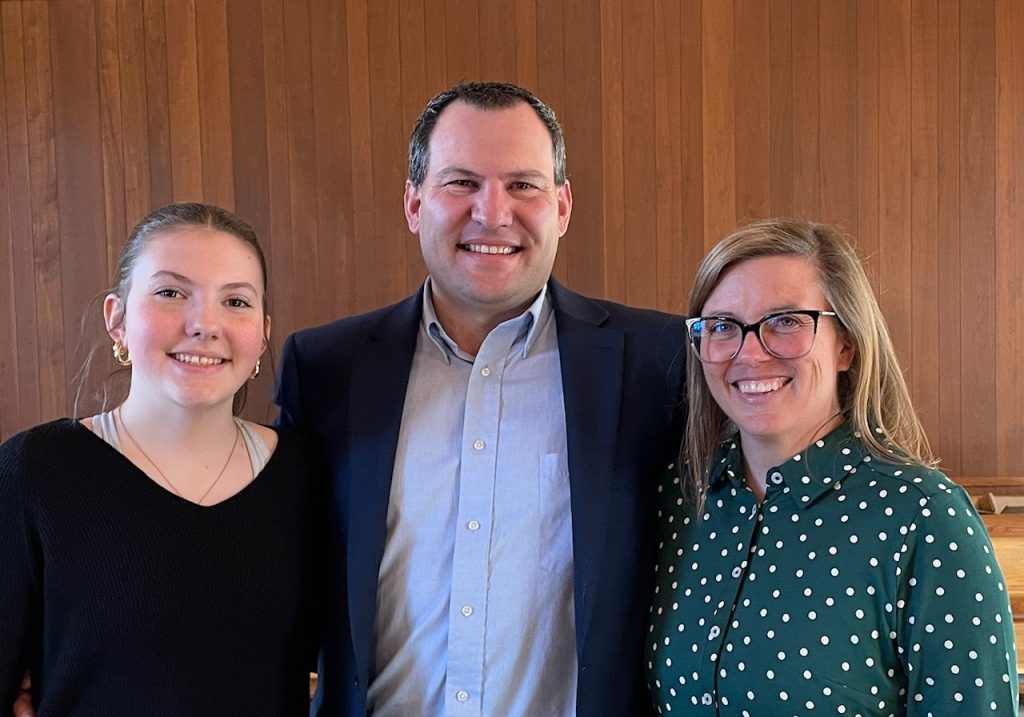On February 4, 2024, Dr. Corey Cockerill, interim president of Wilmington College, gave the following message during worship at Cincinnati Friends Meeting.
I shared this message in the fall with Wilmington Friends. And I cannot seem to shake it. It continues to resonate with me—perhaps even more today. It’s about handling the turbulence of life. And it starts with a poem about a tiny yellow flower. It’s called “Forsythia” by Jarod Anderson—who happens to be from Dublin, Ohio. Here is how it goes:
As forsythia grows tall,
its branches bend beneath their own weight,
bowing to the ground in arches of yellow flowers.
Wherever they touch the earth,
the branches root again and send up new shoots,
stitching gold across the landscape.
Some new kinds of knowledge shift our center of gravity,
staggering us,
bending us low beneath the burden.
If you think of your worldview as a stone tower,
this shift is a cataclysm of splintered rock.
If your worldview is forsythia,
then every startling truth that bends you low becomes a new connection
to the earth,
a new way to stand,
an invitation to grow.
We live in a time of strong wind and sudden pressure.
It is not an age for towers.
It’s an age for stubborn flowers.
Those lines—It is not an age for towers. It’s an age for stubborn flowers.—resonate with me. When I think about the kinds of turbulence or “strong winds” that hit me, often unexpectedly, and they’re winds so powerful they shift my center of gravity, I am immediately intimidated. How do we bravely face this turbulence? Like the forsythia, how do we bend instead of break?
I find my anchor and my answer within the Quaker testimonies. How do the Quaker testimonies or what we call “the SPICES” help us become less like unwavering stone towers, and more like stubborn flowers?
We start with Simplicity.
Simplicity, to me, often means the opposite of chaos.
Simplicity reminds me to embrace silence, to listen carefully and mindfully, to sort out the clutter. Sometimes it means choosing to focus on a small handful of goals instead of trying to be everything to everybody—especially in turbulent times. Embracing simplicity means distilling down to what is true and genuine. We have to know who we are before we can grow and spread.
The second testimony of the SPICES is Peace.
Peace reminds us to be resolution-seekers, to be delicate, to lead with love. The phrase I’ve been repeating lately is: be gentle with each other. The world is already sharp enough.
The peace testimony to me is symbolized in the delicate yellow flower of the forsythia—stubborn, OK, but still a flower.
The third testimony is Integrity.
Integrity suggests we come to the table with good intentions, that we communicate clearly and openly, that we recognize and take ownership over our own mistakes. Stone towers may appear to have integrity—until they shift and splinter. It is when we come to expect turbulence and tumult that we can develop resilient systems, even those that be improved through the turbulence.
Next up is Community.
In nature, we never encounter just a forsythia bush in isolation. Wild flowers bloom in communities. In fact, pollination requires diverse species of plants and flowers. Applying this metaphor, humans thrive among diverse ideas and voices.
Being towers sometimes means we deflect others’ ideas.
Being flowers means we cross-pollinate, collaborate, share, adapt.
Equality.
The Light of God in everyone means we are all equal by that Light.
"Being gentle with each other" means we recognize that Light upfront, often, and even when it is hard. Sometimes being a stubborn flower means being stubborn with ourselves—a stubborn reminder to see the good, be the good.
Finally among the SPICES is Stewardship.
To me, this means showing up, not withering away.
It is easy to hide and dodge the chaos of every day. But hiding isn’t stewarding. Loving thy neighbor is stewarding. Answering a calling is stewarding. Giving your time to others in need is stewarding. When facing strong winds, we have to choose to show up and work together as stewards of each other. If we show up, we learn and grow—and become well-grounded as a result.
The SPICES not only remind me that I must bend, but they show me how.
To close, consider the line: We live in a time of strong wind and sudden pressure.
Are we building stone towers (of ourselves) that lack integrity? That crumble? Are we rigid in the way we receive information? Are we rigid in our decision-making?
More and more, I believe our work calls for us to be forsythia.
Bending and adapting with the challenges.
Setting new roots so you don’t lose touch with the earth as you grow.
Blooming boldly and brightly so that others can see.
Surrounding yourself with other colorful flowers to invite cross-pollination of ideas and cultures.
And persisting—even stubbornly—in your stewardship of others.
Don’t hide from the wind and pressure.
Allow it to bend you low
to make a new connection to the earth,
to stand solidly,
and to grow.

